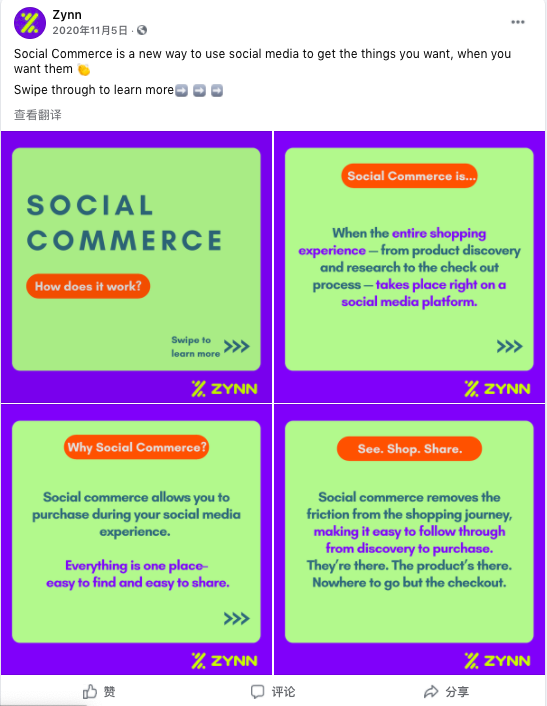The effect of overseas TikTok live streaming is still not ideal.
Editor’s note: This article is from the WeChat public account “Passagegroup” (ID:passagegroup), author Xie Xiaodan.
In May 2020, a short video app called Zynn landed on the Apple App Store and Google App Store, and soon became a dark horse in the US App Store topped the list, surpassing Instagram, YouTube, TikTok and Zoom in one fell swoop.
Overseas users quickly discovered that Zynn’s breakthrough was a money-splitting strategy: by inviting friends and watching short videos to earn cash for red envelopes. Using this model, Zynn once surpassed TikTok and topped the download list of the US App Store shortly after its launch.
Soon this real money promotion method was stopped, but Zynn soon defined himself on social platforms: social e-commerce, and his other identity is an internal project incubated by Kuaishou.
Kaishou is not the only company planning to enter overseas e-commerce. Within ByteDance, cross-border e-commerce projects are also quietly deployed. Huanjiage, which has products such as Bigo Live and Likee, has also strategically invested in cross-border e-commerce platform shopline, and has listed e-commerce as a major strategic goal of the group.
Why are short video giants collectively entering e-commerce?
Bigo Live launches live broadcast e-commerce in the Middle East and North Africa
“In 2021, Bigo Live will focus on live e-commerce and gaming in the Middle East and North Africa.” Recently, the Bigo Live team under Huanju Times revealed to Gadget Voize that the long-term goal of 2021 will be more focused on content creation And consumption.
The above information shows that after All in overseas markets, Huanju’s future layout in the field of e-commerce is about to accelerate. In June 2020, Huanju invested in the community e-commerce platform Tongcheng Life. In August, it strategically invested in the cross-border e-commerce platform Shopline.
In August 2020, during the Q2 earnings conference call, CEO Xueling Li announced in a high-profile manner that in the future, the company’s revenue will be converted to e-commerce as the mainstay, supplemented by live broadcast, plus a portion of advertising revenue. Li Xueling said: “E-commerce business is the company’s long-term goal, and we attach great importance to this. We also have enough patience to focus on the long-term development of e-commerce business in the next three to five years.”
Huanju believes that it has three advantages as an e-commerce company: it has 450 million monthly active users overseas, its manufacturing and supply chain advantages, and artificial intelligence technology. Through short videos, they have greatly exercised their skills in artificial intelligence.Technical capabilities in each field, including video recognition, object recognition, voice recognition, face recognition, plus recommendation algorithms, these core capabilities can be used in the field of e-commerce in the future. Huanju said that ordinary e-commerce or a single commercial website cannot promote such a large-scale computing power.
Li Xueling also made it clear that e-commerce will be a major strategic goal of Huanju Group in the future. Three months later, on the Q3 earnings conference call on November 17, Li Xueling added again: “Our investment in China’s e-commerce does not mean that we want to do e-commerce in China.”
This also means that if Huanju’s e-commerce business is not based in China in the future, Huanju’s battlefield must be overseas.
Bigo Live
In the context of Huanju seeking overseas e-commerce development, its investment in Shopline is intriguing.
Founded in 2013, Shopline is an online platform that helps e-commerce merchants sell products directly to consumers on independent websites. Some people call it the Asian version of Shopify.
According to Shopline’s official website, the company currently has teams in Hong Kong, Chinese Taipei, Mainland China, and Vietnam. The platform can radiate 10 countries and regions in Asia, and more than 250,000 brands around the world use Shopline to open stores, and in 2019, it has assisted stores in reaching 350 million customers.
Shopline said that this round of funds will mainly be used to recruit talents and expand the Southeast Asian market. It is currently locked in Vietnam and Malaysia. In order to further commit to the development of Southeast Asia, SHOPLINE will establish a regional headquarters in Singapore.
Although it is currently uncertain whether Huanju will work with Shopline to build its live e-commerce business, Huanju has already found a strong partner through this round of investment.
Bytes hold on to Shopify
TikTok, owned by ByteDance, is also quietly launching cross-border e-commerce.
In June 2020, Bytedance completed a round of major adjustments to the organizational structure of e-commerce business-formally established a first-level business department clearly named “e-commerce” to coordinate the company’s Douyin, Toutiao, watermelonE-commerce business operation of multiple content platforms such as video.
“E-commerce” has clearly become a strategic business of ByteDance, and Douyin is the most important platform to undertake the ByteDance e-commerce strategy. According to the current development situation, the Douyin store has been close to a year Here, it has gradually become the backbone of Douyin’s e-commerce business.
In terms of cross-border, in October, ByteDance added a cross-border e-commerce import business “Fuxianghaigou”. The project is embedded in Douyin and Today’s Toutiao App in the form of a small program, Fuxianghai Go is a cross-border boutique shopping mall that includes well-known brands in more than ten countries. Douyin has also extended its reach to the field of cross-border e-commerce.
In terms of export, in December this year, LatePost reported that Zhang Yiming released an internal letter. ByteDance is exploring an export-oriented e-commerce project, codenamed “Magellan XYZ”, led by Zhou Chong to Reported by Kang Zeyu, head of byte e-commerce.
TikTok app screenshot / Chrome App Store
Soon, Bytedance denied the news. However, according to Zhixiang.com, Bytedance is already building a team focused on export e-commerce. Cross-border fashion brand entrepreneur Li Hualian (pseudonym) revealed that Byte has been integrating and building teams last year. The export cross-border team partly comes from the product team banned by India. In the future, Byte’s e-commerce project may be launched in Southeast Asia first. .
Another person close to Bytedance also told Zhixiang.com that BYTE’s cross-border e-commerce project has already begun internal testing.
According to Li Hualian, Byte currently has two teams, commercialization and e-commerce. Public information also shows that TikTok moves frequently in these two areas.
In May 2020, Insider Intellegence discovered that TikTok quietly added advertisements in videos, embedding “Shop Now” links in creator videos, and the advertising revenue was divided between TikTok and content creators.
In addition, in October 2020, Shopify also announced a global cooperation with TikTok. Shopify said on Tuesday that the TikTok channel is currently launched in the United States and will be launched in other specific markets in North America, Europe and Southeast Asia in early 2021.
TikTok channel enables merchants to create and connect to himOur TikTok For Business account and deploy video ads directly in Shopify. Shopify and TikTok also stated that they will also collaborate in the next few months to test new transaction features to further enhance traders to expand their payment and organic coverage in videos and profiles.
Short video + live e-commerce, Can you replicate the domestic popularity overseas?
On this track, Kuaishou did not place an order, and its weapon was Zynn.
Zynn released a brief introduction about the social e-commerce gameplay, and many sellers began to comment on how to promote and market on Zynn.
Zynn official account screenshot / Facebook
Bytedance is also committed to exporting live broadcasts to overseas.
On December 18, 2020, U.S. time, TikTok and Wal-Mart jointly launched a live broadcast. Internet celebrities will provide users with brands such as Champion, Jordanache, Kendall + Kylie, and private brands such as Free Assembly, Scoop and Sofia Jeans. Product recommendation. In the live broadcast, consumers can click on the product icon on the live page to add it to the shopping cart, or directly click the shopping cart icon on the screen to select the product to purchase.
However, Li Hualian is currently focusing on short video delivery, and he is relatively cautious about overseas live delivery. He believes that the performance of live delivery needs to be observed. Another entrepreneur who tried live streaming on TikTok also admitted that the current effect is not very good.
“Live broadcast e-commerce will definitely export.” In the eyes of Xu Fei (pseudonym), an investor who has been observing cross-border e-commerce for a long time, it is an inevitable choice for these companies to develop into e-commerce. Xu Fei also told Zhixiang.com that the market is also eager for the emergence of new platforms. “Cross-border e-commerce is suffering from the three giants of Facebook, Google, and Amazon for a long time. Everyone is eager for new traffic dividends. This kind of opportunity may bring Explosive growth.”
Now, Tiktok has over 2 billion downloads and 800 million monthly active users worldwide. It is estimated that monthly active users will exceed 1.2 billion in 21 years. However, Li Hualian believes that TikTok, which handles traffic, is still far behind Douyin in terms of infrastructure. Compared with Facebook, TikTok’s e-commerce infrastructure is still lagging behind. First of all, the accuracy of algorithm recommendation is not so high. In the US market, only some talented people can open the function of adding shopping carts, and unlike domestic platforms, there are special platforms. , The brand still needs to find people who bring goods by itself. At least in the European and American markets, TikTok is not as efficient as its main competitor Instagram, and Instagram’s expansion has been very aggressive.
Xu Fei believes that compared with the domestic market, Taobao has opened live broadcasts since 2016, but the entire industry has only become popular in 2019. The appearance of phenomenal anchors such as Wei Ya and Li Jiaqi has driven changes in the entire industry.
Now, the celebrity economy market is slowly starting overseas. According to the iResearch report, in 2019, the scale of domestic fan economic association has exceeded 3.5 trillion, far exceeding overseas. In the future, the overseas fan economy market will catch up with the domestic market, and the overseas celebrity economy market will become one of the fastest growing markets for overseas industries.
Many companies have also targeted MCN to go overseas. According to reports, GS Media (KOL SUMMIT) is a cross-border media company focusing on cross-border services and overseas Internet celebrity economy. Its overseas MCN agency has signed hundreds of Tiktok head bloggers in North America. It is China’s first Tiktok overseas version of Tiktok MCN celebrity agency, with more than 100 million fans on the entire network, and has become a North American Tiktok contract. MCN with the largest number of KOLs per person.
GS signed a contract with one of the North American Tiktok bloggers with 1.1 million fans. In the first half of December this year, the sales of short video products reached 680,000 US dollars (about 4.5 million RMB). Accurately divert North American consumer traffic to Amazon sellers, with an average conversion rate of 7%.
Many similar MCN overseas companies have begun to develop overseas. According to the report, the cross-border market and the overseas short video celebrity economic market are experiencing an unprecedented window, and the next 5-10 years will be a period of market outbreak.


